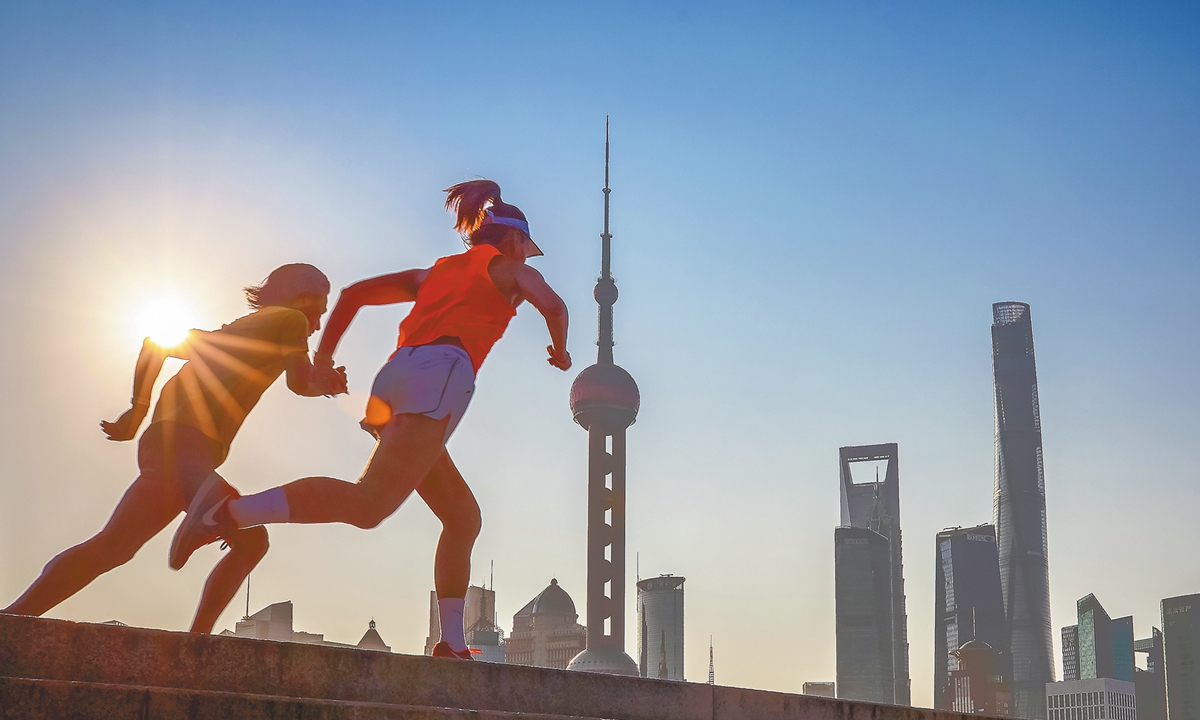
Photo: VCG
Sports are a reflection of a nation's spirit and an epitome of a country's strength. On the occasion of the 75th anniversary of the founding of the People's Republic of China, four athletes mentioned by Xi Jinping, Chinese president and general secretary of the Communist Party of China (CPC) Central Committee resonated with a lot of people as their life experiences are a microcosm of the times.
In 1932, 1959, 1984, and 2024 respectively, Liu Changchun, Rong Guotuan, Xu Haifeng, and Zheng Qinwen - these four athletes marked the milestones of China's breakthrough on the global sporting stage, spanning nearly a century of progress.
The world has undergone fundamental changes over the last century. The century has witnessed the centenary of the CPC's glorious journey; the centenary of the Chinese nation, which has achieved the tremendous transformation of standing up and growing prosperous to becoming strong; and the centenary that witnessed the Chinese people evolve from "looking up to the world" to "looking at the world on an equal footing."
Epitome of the times
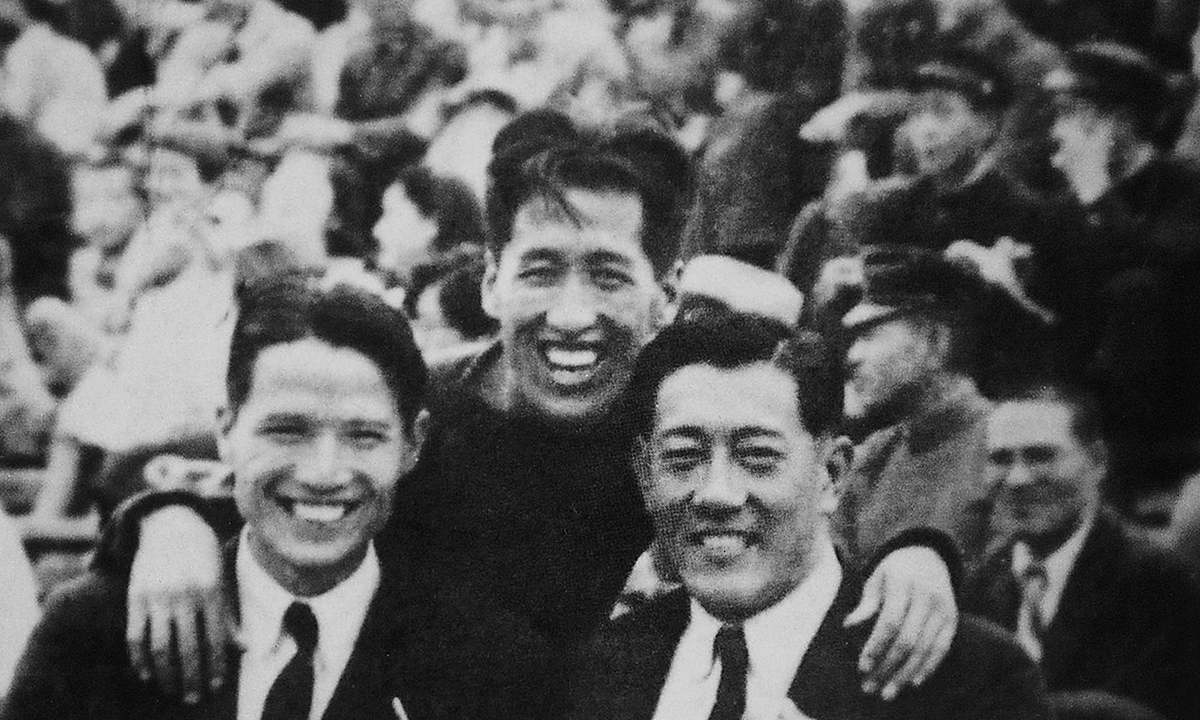
Liu Changchun (center) poses for a photo with friends at the 10th Olympic Games in Los Angeles, in July 1932. Photo: VCG
In 1932, Chinese sprinter Liu stood alone on the starting line, a sight that still evokes deep sorrow today. It was indeed a heartbreaking era. The country was lost, and uncertain about its future direction.
Just a year after the September 18 incident, Liu arrived in Los Angeles for the 10th Olympic Games, weary from his journey and with little preparation. He was the only Chinese athlete in the opening ceremony. Unsurprisingly, he was eliminated in the preliminary rounds. How could a barren land support the dreams of a nation? In his diary, Liu wrote woefully, "When the flags of the top three winning nations were raised high, I can only feel endless lament."
The world, too, sensed the desire of an ancient nation, once closed off and then was forced to open by powerful ships and cannons, to re-enter the global stage, from the arduous journey of Chinese athletes participating in the Olympics for the first time.
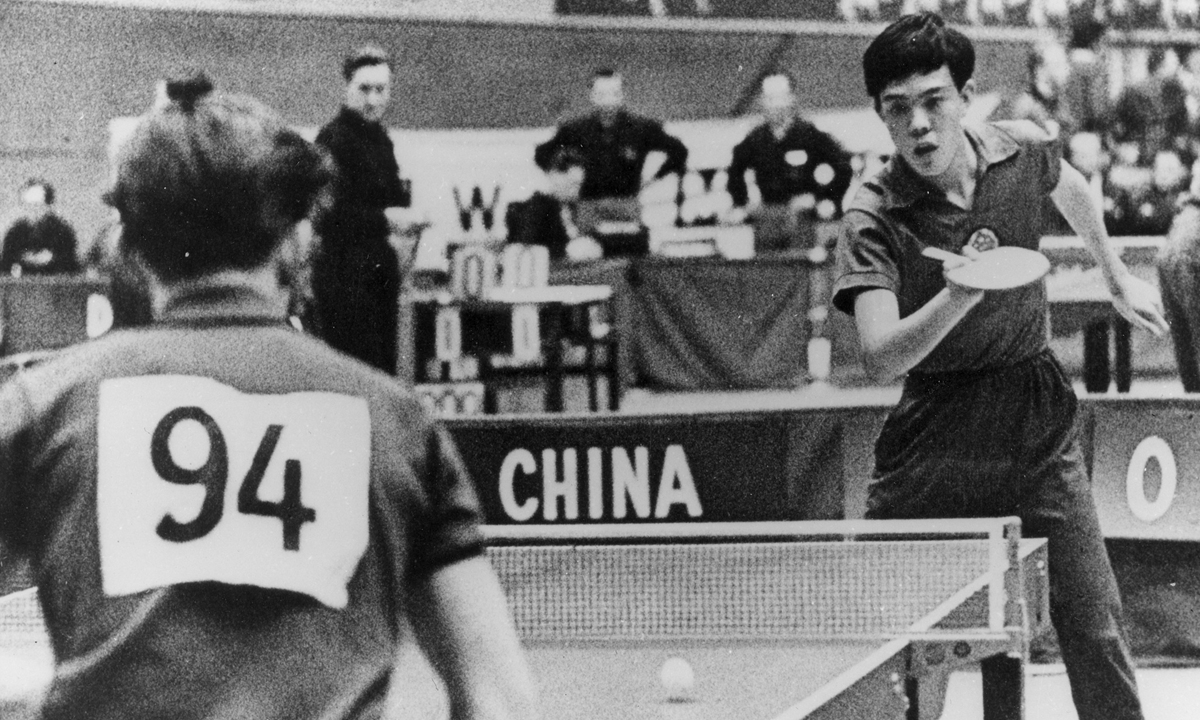
Rong Guotuan competes in the men's singles at the 25th World Table Tennis Championships in Dortmund, Germany, in April 1959. Photo: VCG
As time has passed, the new China, the People's Republic of China founded in 1949, emerged. Table tennis player Rong, carrying a heartfelt application letter expressing his desire to serve his country, traveling from Hong Kong to the Chinese mainland. In 1959, at the World Table Tennis Championships in Dortmund, he won the first world championship for China.
Following that achievement, at the 1961 World Table Tennis Championships in Beijing, Rong helped the Chinese men's team to win the first team title. He also led the women's team to win its first champion at the 1965 World Table Tennis Championships. Many of the significant milestones in Chinese sports were closely linked to Rong.
It was a passionate and vigorous period of construction during which the people truly became the masters of their own destinies. With the ambition to change the world, they built factories and cultivated farmland, while also showcasing the "latest and most beautiful images" in various sports fields. The names of many athletes such as Rong, Chen Jingkai, Zheng Fengrong, and Zhuang Zedong were evidence of the vibrant progress of the newly born People's Republic of China. "Developing sports and enhancing physical fitness of the people" became a rallying cry as a rejuvenated Chinese sports scene began to emerge on the world stage, much like the young People's Republic of China itself.
In 1978, the reform and opening-up policy marked the beginning of a new march toward the Chinese path to modernization. In 1984, at the 23rd Olympic Games in Los Angeles, Chinese shooter Xu Haifeng fired a shot that marked China's breakthrough in winning its first Olympic gold medal, creating "a great day in the history of Chinese sports." On this occasion, China sent a sports delegation of 353 members, winning a total of 15 gold medals.
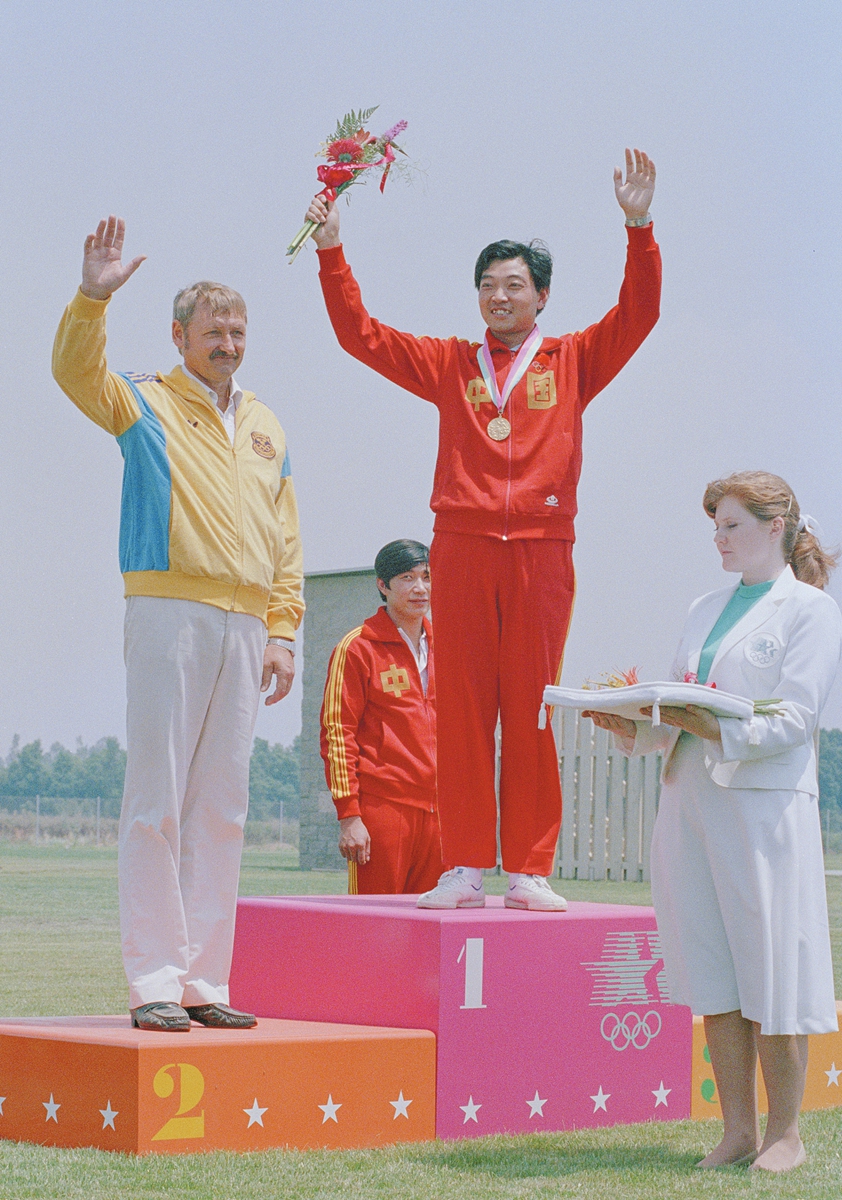
Xu Haifeng (center) wins China's first Olympic gold medal at the 1984 Summer Olympics in Los Angeles, on July 29, 1984. Photo: VCG
Desire to catch up with the worldFor the Chinese people, performing the song of "March of the Volunteers" on the world stage transcends mere victory; it embodies the long-held aspirations and desires of the Chinese people to showcase their strengths and capabilities to the world.
The memories of China's sporting prowess in the 1980s, particularly the unparalleled five consecutive championships achieved by the Chinese women's volleyball team, are still vivid. The rallying call "Learn from the women's volleyball team and revitalize China" became a powerful anthem for a generation striving for national rejuvenation. It reflected a desire to catch up with the world.
Now, as China enters the New Era, it stands on the global stage closer than ever before to achieving its grand rejuvenation goal. Thriving sports has also become a chapter in the annals of revival.
The summer of this year saw the Chinese Olympic athletes bid their blood, sweat, tears, laughter, and moments of pity and bittersweet farewell at the Paris 2024 Olympics. They also etched countless moving and inspiring stories into history, achieving the best-ever performance by Chinese athletes in an overseas Summer Olympics. Notably, Zheng Qinwen made history by securing Asia's first Olympic women's singles gold medal in tennis.
In her post-match remarks, deeply imbued with patriotism, Zheng eloquently expressed, "Competing for my country has given me immeasurable strength." "National honor always surpasses personal glory," she further stressed.
Individual destinies and national destinies are interwoven. Chinese youth have grown alongside the nation's progress.
The transformation across these four historical moments spanning nearly a century paints a vivid picture: The shifting tides of national fortunes and the parallel evolution of the youthful spirit that marches in step with the nation.
Xi has frequently spoken with passion about the "Three Olympic Questions": "When could China attend the Olympics?" "When could China win an Olympic championship?" and "When could China host the Olympics?"
In 1908, China faced a precarious national situation, and many patriotic individuals yearned for salvation. These soul-stirring questions were posed by organizers of China's first national games in an article titled "Advent of the National Games of China" published in the Shen Bao newspaper in July 1910.
Today, a century later, these three questions have finally found complete answers: From Liu's solo journey to the 1932 Los Angeles Olympics to present day when China sent a contingent of, 405 athletes to the Paris 2024 Olympics; From Xu securing China's first Olympic gold medal in 1984 to the number of gold medal won at the Paris 2024 Olympics by Team China exceeded 300; From the unparalleled Beijing 2008 Olympic Games to the Beijing 2022 Winter Olympics, making Beijing the world's first-ever dual Olympic city.
Dreams coming true
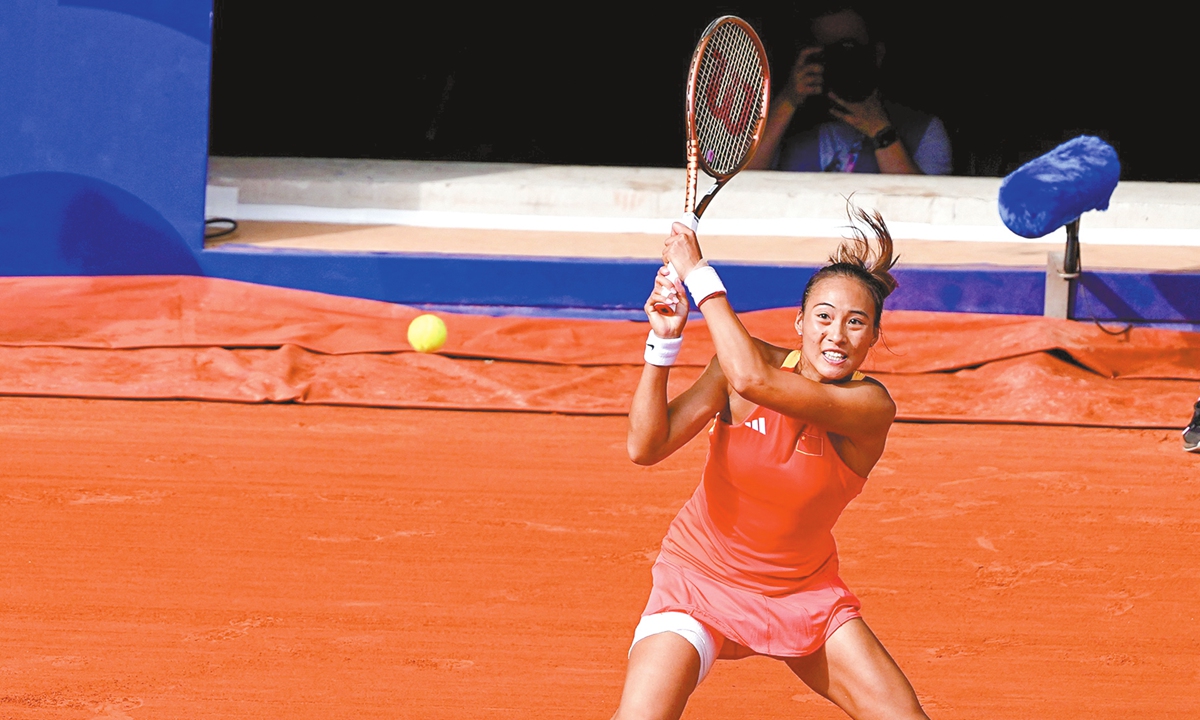
Zheng Qinwen competes during the women's singles final of the Paris Olympic Games at Roland Garros Stadium on August 3, 2024. Photo: VCG
Building dreams, pursuing dreams, and realizing dreams - China's dreams are continuously coming true. "How many times can one truly fight in life?" and "If not now, then when?" These are not only the maxims of sports, but also resonate as declarations of China's relentless spirit of struggle.
Rising from the brink of "being expelled from the game" and starting from the scratch, China has penned a powerful chapter in the epic of the nation's arduous journey. The ambition, integrity, and confidence of the Chinese people have been steadily fortified through this process. China is looking more calmly at the gold medal, and its perspective on the world stage has grown more self-assured.
After years of development, the generations born in the 1970s, 1980s, 1990s, and 2000s in China have stepped out into the world and can now look at the world on an equal footing. This is confidence, said Xi.
When the fortunes of the nation flourish, so too does its sports; when the country grows strong, so does its athletic prowess. Within sports lies the essence of an era, the spirit of a people, the strength of a nation, and the well-being of its citizens.
Once, China was labeled the "sick man of Asia." The image of a pale, emaciated figure gasping for breath was a reflection of an era marked by hardship and despair.
In 1917, the Chinese literary magazine New Youth published an article on the study of physical education, authored by young Mao Zedong. Mao appealed to strengthen the national physique, voicing the aspirations and dreams of Chinese youth during a time of poverty and weakness.
Over the course of a century, the relationship between sports and the people, as well as between sports and the nation, has evolved into a grander vision.
Today, the promotion of fitness for all has ascended to a national strategy, with the aspirations of a strong sporting nation and a healthy China intertwined. In recent years, when bidding and preparing for the Beijing 2022 Winter Olympic Games, a key focus for Xi was to "inspire over 300 million Chinese to participate in winter sports, which will contribute greatly to the development of the International Olympic Movement."
In a rapidly changing China, we are advancing and forging ahead, continually rewriting history. "Tremendous changes have taken place in China, and the great rejuvenation of the Chinese nation is now on an irreversible historical course," stated Xi on the evening of September 30 at a reception to celebrate the 75th anniversary of the founding of the People's Republic of China.
This speech serves as a call to action. The path to a leading sporting nation reflects the journey of the great rejuvenation of the Chinese nation.
The story was originally published on People's Daily on October 4, 2024
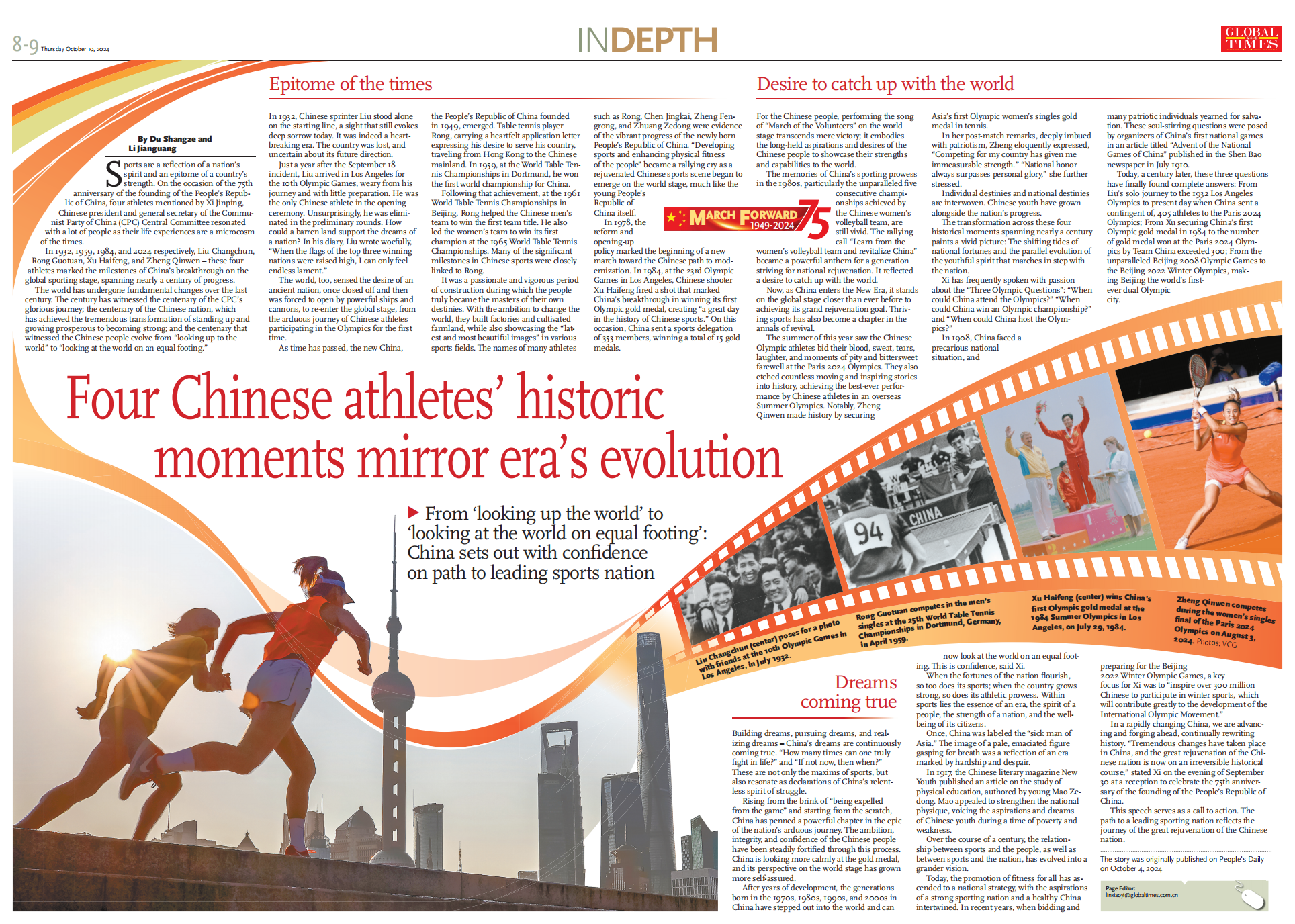
Four Chinese athletes' historic moments mirror era's evolution









